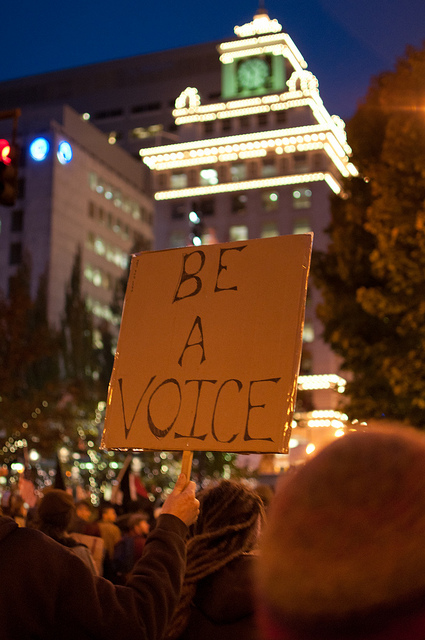Here’s a confession: I am one of those annoying people who discusses politics in mixed company, often with strangers I’ve just met. When I tell people I’m involved with Occupy Portland, the first response I often get is a string of questions—sometimes motivated by honest curiosity, sometimes issued in mocking challenge—that come down to “What’s this movement all about?” and “What are you hoping to accomplish?” Those are broad questions, but finding specific answers to them is part of what has kept me going to Chapman and Lownsdale Squares the past few weeks. Those questions also touch on broader themes that have become apparent in our social discourse of late—questions of where we are as a society, why we’re at that place and where we should be going instead. The Occupy movement is a reaction to, and direct result of, the shattered America my generation has inherited, and to ask what may seem even the simplest questions about it invites a Gordian Knot of side-issues. So, let me get out my pocket knife and saw at a few threads.
One question that I haven’t heard anyone ask so far is, “What made this movement necessary?” We all seem to understand, in a general sense, that the time of great social movements is again upon our society; if history is indeed a wheel, we seem to have rolled again to its revolutionary spoke. There has been a sense of inevitability hanging in the air for years now, a feeling that the American people were being pushed ever nearer to an undefined but well-recognized edge—have you felt it too? But let’s not get too caught up in considering the specific issues at the moment; rather, I’d like to focus on the fact that one of the major failings of our civilization, and perhaps the central reason we’ve all felt this pressure building for so long, is that there hasn’t been a suitable platform for discussion of these issues.
Political issues are discussed in America, of course—on television, by loud, furious talking heads who shout narcoleptic slogans past each other; on the internet, by die-hard partyliners determined to out-flame the other team in the comments sections on news stories; in homes and among circles of friends, where one can usually count on some level of basic agreement thanks to shared values and experiences. Surely it’s time we admitted that the Craigslist rants and raves section is the not the appropriate forum for or level of political discourse for this national community—and yet, haven’t we turned to such outlets precisely because we have lost our sense of community? With this realization, we approach the subject of why the Occupy movement is now necessary and the first function I have seen its Portland specimen serve—the Occupy movement is twenty-first century America’s desperately needed social networking platform. It’s Facebook for political restructuralism.
I hope that’s not too shocking a comparison. Ninety-nine could just as well be the number of hours I spend on Facebook some weeks, and I don’t even play the life-devouring games. Most of my time on Facebook seems to be spent shoring up relationships with people I don’t get to see often enough. I trade funny pictures with people from my high school years; I refer to old in-jokes with friends I made on a message board I used to frequent my first year of college; I peek through windows into the lives of cousins that time and distance have robbed me of the opportunity to better know. Some of these relationships seem shallow in comparison to the ones I have in the “real world” (if that term still has any meaning in 2011 CE), but all the same, they’re relationships that might not exist without Facebook to make them possible.
The Occupy movement, like Facebook, serves as a platform to bring together those who have been separated by geography and social stratification these past few decades. I have seen Occupy Portland serve as a place for WWII veterans to talk with Iraq War protesters (many of whom are veterans themselves); I have seen Generation X professors holding interactive educational workshops for blue-collar babyboomers who never had the opportunity to attend college; I have seen people with Ron Paul signs and people passing out literature for the Socialist Party having perfectly amiable conversations about the best way to end the Federal Reserve system. The vital conversations that haven’t been happening in American society the past few decades are happening now on Occupied grounds, and for the most part, they’re happening at a mature, respectful level. I suppose in that respect, Occupy may have little in common with Facebook—though that might have something to do with people generally being more polite offline than on. But it seems evident that Occupy owes its immediate success to filling the same void that Facebook seeks to fill. Call it the need for the tribe, or the longing for community; call it the absence of fellowship or a sense of having been unplugged from the collective unconscious. There is a feeling in the pit of one’s stomach that we have lost something, and only now, as we rediscover just what that something is, do we begin to realize the damage its absence has done to our civilization.
So let’s talk about what it is we’ve lost, how Occupy seeks to fill that void, and what that loss has led our society to become. It’s a subject I’ve been thinking on for some time now, and spending the past few weeks with my fellow Occupiers has helped me put those thoughts in order. In the next section I’ll get deeper into the matter of where our society finds itself now, how the meta-narrative the elite has provided us (and that we largely traded our sense of community for) has spectacularly failed us, and the traps we keep falling into as a civilization that have led us here to begin with.








